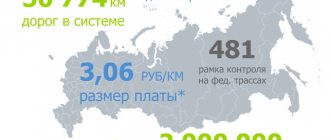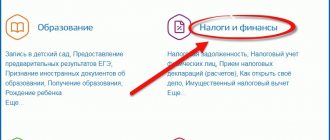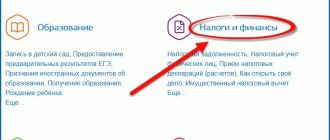In connection with numerous discussions on the topic of the financial burden borne by the owners of heavy vehicles, starting in November 2015, questions related to the abolition or change of the procedure for calculating transport tax on trucks are constantly being raised.
Next, we will look at how the duty on freight transport is calculated in 2021 and whether the transport tax for heavy trucks has been abolished.
An advantageous offer from the partners of our portal - Terem Loan! Apply for a loan in the amount of up to 30 thousand rubles for a period of up to 30 days.
100% approval!
Get money
Transport tax on trucks in 2021
Transport tax is paid according to the rules established by the Tax Code of the Russian Federation (Chapter 28, Article 356) on the basis of the basic (state) rate. In this case, the purpose of the payment is to replenish regional budgets. Consequently, the transport tax for each region is approved at the legislative level of the constituent entities of the Russian Federation and is a mandatory payment for each car owner ( Chapter 28, Article 357 of the Tax Code of the Russian Federation ).
The tax period is the reporting year. Tax rates, determined by laws at the regional level, can be increased or decreased in relation to the base (state) rate. Their size is influenced by:
- engine power , measured in horsepower.
- Gross tonnage.
- Vehicle category.
- Year of car manufacture.
Moreover, in each subject of the Russian Federation and cities of administrative significance, the authorities determine who can use transport benefits.
Vehicles belong to different groups according to category and type (this information is in the registration certificate).
Car categories are divided into five groups:
- Motor transport (“A”).
- Passenger cars with a weight of no more than 3.5 tons and a number of passenger seats of no more than 8 (“B”) .
- Vehicles weighing more than 3.5 tons (“C”).
- Vehicles with passenger seats (“D”) .
- Trailers designed to travel with a vehicle (“E”) .
Each category and type of vehicle has its own rates. Tariffs for freight and passenger transport may differ several times.
All-Russian base rates for transport taxes on heavy trucks
In 2021, the transport tax rate remains unchanged . The abolition of this category of payments is not envisaged, since it is one of the most significant sources of financial revenue to the state budget.
In each subject of the Russian Federation, the transport tax on trucks is calculated independently, however, there are all-Russian state rates (basic), which are based on engine power, which is measured in horsepower. At the same time, the amount of the transport tax, which is charged in 2021 in the regions, may differ from the state level (increasing or decreasing) by no more than 10 times (Chapter 28, Article 361 of the Tax Code of the Russian Federation) in relation to various categories of cars and their age , ecological class.
For each horsepower of trucks, the following base rate is established, measured in rubles ( Chapter 28, Article 361 of the Tax Code of the Russian Federation ):
- up to 100 hp - 2.5;
- from 100 to 150 hp - 4;
- 150-200 hp - 5;
- over 250 hp — 6.5 .
The tax amount established for each region can be viewed on the official website of the Federal Tax Service.
In order to find out the amount of tax on freight transport today, it is enough to know the engine power, measured in horsepower.
Payment in the "PLATON" system. Accounting and Taxation
Trade organizations that own trucks with a permissible maximum weight of over 12 tons, from November 15, 2015, are required to pay a fee to compensate for the damage caused to roads by such vehicles.
Board size
Operating principle of the Plato system
The toll collection system acquired the name “Plato”. According to its developers, this is a derivative of the phrase “payment per ton”.
Let's consider accounting and tax accounting of transactions related to payments to the Platon system.
Accounting for payments in the Platon system when calculating transport tax
At the same time, the lessor cannot reduce the transport tax for the truck registered to him by the fee to Plato paid for this truck by the lessee (Letter of the Ministry of Finance dated No. /41940).
Payment to “Platon” reduces the transport tax payable only on a specific truck and does not affect the amount of tax for other vehicles (Letter of the Ministry of Finance dated No. /47021).
If the law of the subject of the Russian Federation in which the truck is registered establishes reporting periods for transport tax, then you calculate advance payments for the truck in the usual manner (without reducing the fee to Platon), but do not pay it to the budget (clause 2 of Article 363 of the Tax Code RF, Letter of the Federal Tax Service No.
Accounting
| Wiring | Operation |
| On the date of transfer of money to the Platon system | |
| D 76 - K 51 | Money was transferred to the Platon system |
| On the last day of the month | |
| D 20 (23, 25, 26, 29, 44) - K 76 | Expenses reflect fees accrued for trucks in the Platon system. |
The entry for the calculation of transport tax at the end of the year is made only for the amount of tax payable:
| Wiring | Operation |
| D 20 (23, 25, 26, 29, 44) - K 68 | Transport tax has been charged for the truck (to the extent that it exceeds the amount of payments accrued in the Platon system for this truck for the year) |
Accounting for fees in the Platon system for income tax and under the simplified tax system
If the result of the calculation is zero, then nothing is taken into account in your expenses.
If the result is a negative number, then the expenses should take into account the amount of transport tax payable for the truck, and the payment to Plato is not included in the expenses.
Under the simplified tax system, transport tax is included in expenses on the date of payment (clause 3, clause 2, article 346.17 of the Tax Code of the Russian Federation, Letter of the Ministry of Finance dated No.).
The law of the subject of the Russian Federation in which the truck is registered may establish reporting periods for transport tax. In this case:
- calculated advance payments for transport tax are not taken into account in expenses at all;
- on the last day of the 1st, 2nd and 3rd quarters, the fee paid to Plato for a truck for this quarter (no more than the accrued amounts) can be taken into account in expenses in the part exceeding the advance payment for transport tax calculated for the same truck and for the same quarter.
For example, in order to calculate the amount of payment to “Platon”, taken into account in expenses for 9 months, it is necessary to subtract from the amount of payments made to “Platon” for a truck for January - September, the amount of advance payments for transport tax calculated for the same truck for I, II and III quarters.
If the result of the calculation is zero or negative, then nothing is taken into account in expenses.
Example. Accounting for fees in the Platon system when calculating transport tax and income tax
In the subject where the organization is located, reporting periods for transport tax are established, and the tax rate is 70 rubles/hp.
The organization purchased and registered trucks.
| Data | Truck | ||
| First | Second | Third | |
| Maximum permissible weight | Over 12 t | Over 12 t | Less than 12 t |
| Engine power (hp) | 400 | 300 | 250 |
| Fee to Plato paid for the third quarter (rub.) | 9000 | 4000 | – |
| Advance payment for transport tax for the third quarter (rub.) | 7000 | 5250 | 4375 |
| Fee to “Plato” paid for the 4th quarter (rub.) | 4000 | 21 000 | – |
| Transport tax calculated for the year (rub.) | 14 000 | 10 500 | 8750 |
The organization owns three registered in the Platon system.
Let us assume that reporting periods for transport tax are not established by the law of the constituent entity of the Russian Federation and all three trucks have the same characteristics.
Therefore, the amount of transport tax calculated for each of them is the same - 11,000 rubles.
For the first truck in 2021, 13,000 rubles were paid into the Platon system, for the second - 7,000 rubles, and for the third, no payment was made to compensate for damage to federal roads.
Based on the results of 2021: for the first truck, the amount of transport tax will be zero, since the payment to Platon exceeded the calculated amount of transport tax.
And as part of income tax expenses, the difference is taken into account, which is equal to 2,000 rubles.
For the second truck, the amount of transport tax will be 4,000 rubles.
Payments to Platon are not taken into account in tax expenses.
At the same time, income tax expenses based on paragraphs. 1 clause 1 art. 264 of the Code includes the accrued amount of transport tax in the amount of 4,000 rubles.
In relation to the third truck, the accrued amount of transport tax is 11,000 rubles. is taken into account as expenses based on paragraphs. 1 clause 1 art. 264 Code.
The fee to Plato, since it was not paid in 2021, is not taken into account in expenses.
Are all types of freight transport subject to taxation?
Transport tax is charged on all types of heavy equipment that is used to transport cargo : dump trucks , vans , platforms, tractors, multi-axle trucks, small vehicles and light-duty vehicles, pickups .
If the transport is used to perform agricultural or other specialized work, then the transport tax is not charged. Such vehicles include milk tankers , vehicles for transporting fertilizers , poultry , livestock , special vehicles for veterinary services , self-propelled vehicles , tractors , combines , etc. ( Chapter 28, Article 358 of the Tax Code of the Russian Federation ).
Transport duty is not charged on these types of machines only if the owner is a registered manufacturer of agricultural products.
Nuances of calculating tax on freight transport category “B”
The greatest uncertainty for car owners is the tax on flatbed cargo vehicles of category “B” (pick-ups) and on vehicles of the “ van ” vehicle type ( minibuses ), also belonging to category “B”.
Assuming that the letter “ B ” indicated in the PTS in the line “ Vehicle Category ” indicates that the car belongs to the category of passenger vehicles, the owner of such a car is surprised to receive a notification from the Federal Tax Service, in which the transport tax rate is calculated as for freight transport. As a rule, this rate is several times higher than for a passenger car. And this is not a mistake of the tax authorities, since the transport tax is calculated based on the rate, which is determined not by category “ B ”, but by the type of vehicle.
Category “ B ” only indicates that the following vehicles are permitted:
- maximum vehicle weight – no more than 3.5 tons;
- number of passenger seats – no more than 8 .
These restrictions precisely indicate category “ B ” in accordance with the Regulations on vehicle passports and vehicle chassis passports, approved. Order of the Ministry of Internal Affairs of Russia N 496, Ministry of Industry and Energy of Russia N 192 , Ministry of Economic Development of Russia N 134 of June 23, 2005 (clause 28) and Appendix 6 to the Convention on Road Traffic (clause 5) .
Thus, we can conclude:
- Category “B” is not always a passenger car . Trucks that fall under the specified criteria may also be included in this category.
- When it comes to determining the type of car, you cannot focus on category “B” .
Machine classification
The transport tax rate depends on several parameters, including the type of car. When registering with the State Traffic Safety Inspectorate, a classification entry is made in the vehicle passport based on technical characteristics, intended purpose and legal norms.
A machine can be defined as:
- passenger car;
- cargo;
- bus;
- van;
- special purpose.
According to the Convention on Road Traffic, the following categories are accepted:
- “a” – motor transport.
- “b” – equipment weighing up to 3.5 tons, with a number of passenger seats up to 8 pieces.
- “c” – vehicles weighing more than 3.5 tons (except those assigned to the next letter).
- “d” – the number of seats for passengers exceeds 8.
- “e” – trailers.
The calculation of transport tax on trucks mainly falls into categories C and D. Although there are confusing entries in the title, when it is impossible to definitely classify a car as a passenger car or a heavy truck. In this case, the law takes the side of the payer, and a lower rate is chosen.
The transport tax on an on-board cargo vehicle classified as category b, despite its small tonnage, is calculated according to tariffs not established for passenger cars. If the type of car is clearly indicated in the vehicle passport, then other parameters are of secondary importance.
For the purposes of transport tax, trucks are divided into subcategories for which fees are established:
| № | Engine power, l. With. | Basic tariff, rub. |
| 1 | less than 100 | 2,5 |
| 2 | 101— 150 | 4 |
| 3 | 151 — 200 | 5 |
| 4 | 201 — 250 | 6,5 |
| 5 | more than 250 | 8,5 |
Regions can introduce differentiated rates, taking into account the age and environmental class of the car.
Benefits for participants of the Platon system
Platon system was introduced in Russia ( Federal Law No. 68-FZ of 04/06/2011 ), which provides for the obligation to pay a toll when driving on federal roads of vehicles with a permissible maximum weight of over 12 tons . Truck owners are faced with a significant financial burden in the form of two mandatory payments with the same purpose: financing roads intended for public use.
Subsequently, in order to reduce this burden, Federal Law No. 249-FZ dated July 3, 2016 amended the second part of the Tax Code of the Russian Federation. The amendments provide for adjustments to the taxation system for owners of freight vehicles with a permissible maximum weight of more than 12 tons.
In accordance with Article 1 of Federal Law No. 249-FZ dated July 3, 2016 “On Amendments to Part Two of the Tax Code of the Russian Federation,” Platon toll collection system :
- If the amount of payment made under the “ Platon ” system is equal to or exceeds the amount of the accrued tax on a cargo vehicle, then the owner is exempt from paying this tax .
- If the amount of payment under the “ Plato ” system is less than the amount of tax, then the car owner is entitled to a tax deduction equal to the amount of payment made.
It is important that the transport tax benefit is provided to the owner of a freight transport - a participant in the Platon , regardless of who owns the truck: an individual or an individual entrepreneur. This is explained by the fact that when calculating transport tax, individual entrepreneurs are equated to individuals ( Chapter 28, Article 362 of the Tax Code of the Russian Federation ), since there is no special procedure for paying transport tax for taxpayers who are individual entrepreneurs.
The benefit is provided to owners of large cargo for each truck that has been registered in the Platon system
It should be borne in mind that this benefit is provided for legal relations established from January 1, 2021 - for organizations, from January 1, 2015 - for individuals. The law extends its effect until January 1, 2021 .
You can apply for a transport tax benefit in one of the following ways:
- Contact the tax office in person.
- Use the services of Russian Post .
- Leave an application on the Federal Tax Service website in the taxpayer’s personal account.
Payment in the "PLATON" system. Accounting and Taxation
Trade organizations that own trucks with a permissible maximum weight of over 12 tons, from November 15, 2015, are required to pay a fee to compensate for the damage caused to roads by such vehicles.
Board size
Operating principle of the Plato system
The toll collection system acquired the name “Plato”. According to its developers, this is a derivative of the phrase “payment per ton”.
Let's consider accounting and tax accounting of transactions related to payments to the Platon system.
Accounting for payments in the Platon system when calculating transport tax
At the same time, the lessor cannot reduce the transport tax for the truck registered to him by the fee to Plato paid for this truck by the lessee (Letter of the Ministry of Finance dated No. /41940).
Payment to “Platon” reduces the transport tax payable only on a specific truck and does not affect the amount of tax for other vehicles (Letter of the Ministry of Finance dated No. /47021).
If the law of the subject of the Russian Federation in which the truck is registered establishes reporting periods for transport tax, then you calculate advance payments for the truck in the usual manner (without reducing the fee to Platon), but do not pay it to the budget (clause 2 of Article 363 of the Tax Code RF, Letter of the Federal Tax Service No.
Accounting
| Wiring | Operation |
| On the date of transfer of money to the Platon system | |
| D 76 - K 51 | Money was transferred to the Platon system |
| On the last day of the month | |
| D 20 (23, 25, 26, 29, 44) - K 76 | Expenses reflect fees accrued for trucks in the Platon system. |
The entry for the calculation of transport tax at the end of the year is made only for the amount of tax payable:
| Wiring | Operation |
| D 20 (23, 25, 26, 29, 44) - K 68 | Transport tax has been charged for the truck (to the extent that it exceeds the amount of payments accrued in the Platon system for this truck for the year) |
Accounting for fees in the Platon system for income tax and under the simplified tax system
If the result of the calculation is zero, then nothing is taken into account in your expenses.
If the result is a negative number, then the expenses should take into account the amount of transport tax payable for the truck, and the payment to Plato is not included in the expenses.
Under the simplified tax system, transport tax is included in expenses on the date of payment (clause 3, clause 2, article 346.17 of the Tax Code of the Russian Federation, Letter of the Ministry of Finance dated No.).
The law of the subject of the Russian Federation in which the truck is registered may establish reporting periods for transport tax. In this case:
- calculated advance payments for transport tax are not taken into account in expenses at all;
- on the last day of the 1st, 2nd and 3rd quarters, the fee paid to Plato for a truck for this quarter (no more than the accrued amounts) can be taken into account in expenses in the part exceeding the advance payment for transport tax calculated for the same truck and for the same quarter.
For example, in order to calculate the amount of payment to “Platon”, taken into account in expenses for 9 months, it is necessary to subtract from the amount of payments made to “Platon” for a truck for January - September, the amount of advance payments for transport tax calculated for the same truck for I, II and III quarters.
If the result of the calculation is zero or negative, then nothing is taken into account in expenses.
Example. Accounting for fees in the Platon system when calculating transport tax and income tax
In the subject where the organization is located, reporting periods for transport tax are established, and the tax rate is 70 rubles/hp.
The organization purchased and registered trucks.
| Data | Truck | ||
| First | Second | Third | |
| Maximum permissible weight | Over 12 t | Over 12 t | Less than 12 t |
| Engine power (hp) | 400 | 300 | 250 |
| Fee to Plato paid for the third quarter (rub.) | 9000 | 4000 | – |
| Advance payment for transport tax for the third quarter (rub.) | 7000 | 5250 | 4375 |
| Fee to “Plato” paid for the 4th quarter (rub.) | 4000 | 21 000 | – |
| Transport tax calculated for the year (rub.) | 14 000 | 10 500 | 8750 |
The organization owns three registered in the Platon system.
Let us assume that reporting periods for transport tax are not established by the law of the constituent entity of the Russian Federation and all three trucks have the same characteristics.
Therefore, the amount of transport tax calculated for each of them is the same - 11,000 rubles.
For the first truck in 2021, 13,000 rubles were paid into the Platon system, for the second - 7,000 rubles, and for the third, no payment was made to compensate for damage to federal roads.
Based on the results of 2021: for the first truck, the amount of transport tax will be zero, since the payment to Platon exceeded the calculated amount of transport tax.
And as part of income tax expenses, the difference is taken into account, which is equal to 2,000 rubles.
For the second truck, the amount of transport tax will be 4,000 rubles.
Payments to Platon are not taken into account in tax expenses.
At the same time, income tax expenses based on paragraphs. 1 clause 1 art. 264 of the Code includes the accrued amount of transport tax in the amount of 4,000 rubles.
In relation to the third truck, the accrued amount of transport tax is 11,000 rubles. is taken into account as expenses based on paragraphs. 1 clause 1 art. 264 Code.
The fee to Plato, since it was not paid in 2021, is not taken into account in expenses.
Rules and procedure for paying transport tax
The payer of transport tax on freight transport, as in the case of passenger cars, is the owner in whose name the vehicle is registered.
A truck can be registered to an individual or a company (organization, institution).
Payment of transport tax is made by the car owner after receiving the appropriate notification sent by the tax office 30 days before the date of payment to the address that the car owner indicated when registering the vehicle.
The absence of a postal tax notice is not grounds for exemption from payment of the transport tax. If there is no such notice, you should contact the tax office to find out the reasons and receive a tax receipt in person.
If payment of transport tax is not made within the deadlines established by law, then this may be considered a tax, administrative offense or even a criminal offense . In case of tax evasion (including transport tax), enforcement measures are provided.
In accordance with Art. 45 Part 2 of the Tax Code of the Russian Federation, debt is collected in the manner prescribed by Articles 46,47,48 of the Tax Code of the Russian Federation :
- The car owner-taxpayer is notified of the need to pay the debt and penalties for each overdue day.
- Tax authorities file a claim in court , which may decide to collect transport tax by:
- writing off funds (electronic or from bank accounts);
- seizure of property.
For physical individuals, tax can be collected by deducting the required amount from wages. In addition, the defaulter’s travel outside the Russian Federation may be limited.
Article 15.5 of the Code of Administrative Offenses of the Russian Federation provides for administrative punishment for late provision of tax information (declarations, calculations of insurance premiums): a warning or a fine for officials.
If the car owner, evading paying tax, did not report the purchased vehicle to the Federal Tax Service (hid tax information), then the measures provided for in Art. 198 of the Criminal Code of the Russian Federation : fine, forced labor, arrest, imprisonment. For organizations, such measures are provided for in Art. 199 of the Criminal Code of the Russian Federation .
In this regard, car owners (individual, individual entrepreneur or organization) must be personally interested in promptly reporting information about the vehicle to the Federal Tax Service and paying the transport tax on a car (including a truck) on time and in full.










